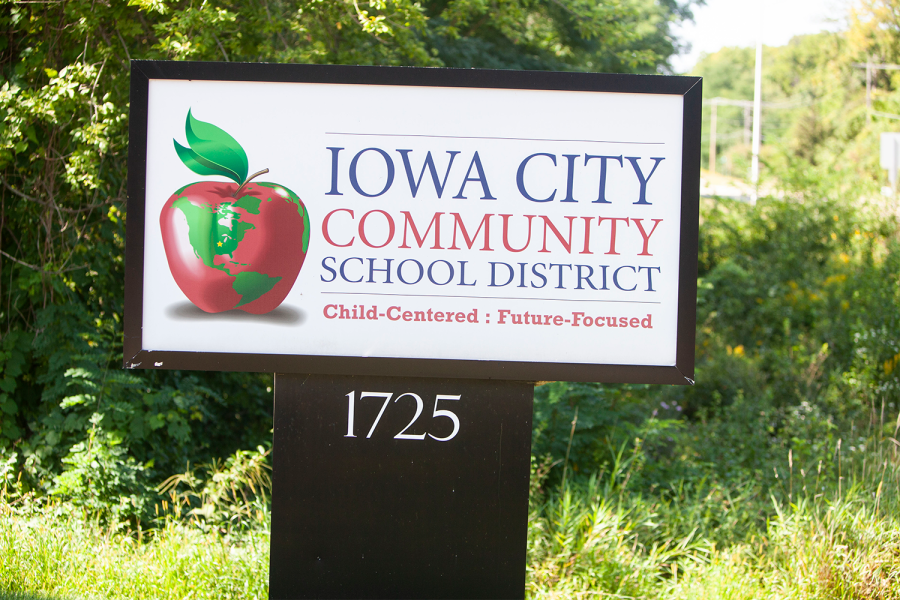Iowa City school district calls for increase in aid, restoration of Iowa Code Chapter 20
In its “Standing Strong for Public Education” document, the school district emphasizes that state aid, mental health services, and collective bargaining is essential.
The Iowa City Community School District sign in Iowa City is seen on Tuesday, Sept. 13, 2022.
February 1, 2023
The Iowa City Community School District is calling for the reinstation of Iowa Code Chapter 20 collective bargaining legislation and more Supplemental State Aid in 2023.
According to the district’s 2023 legislative priorities, a focus is being placed on five key areas:
- Invest in Iowa’s future
- Fully fund a 4-year-old preschool institution
- Ensure that public dollars remain in public schools
- Establish adequate mental health services for kids
- Restore the integrity of collective bargaining
The focus on the restoration of Iowa Code Chapter 20 collective bargaining legislation comes with the hope it will attain more teachers during state-wide shortage, the document states.
“The ability to attract new teachers and retain those currently in the field is paramount. We need to be uplifting and elevating the profession, not taking action to diminish the role of educators. Restoring the full collective bargaining process to our public employees would be a positive first step in that direction,” it states.
Collective bargaining, as stated in a document from the Iowa Legislative Services Agency, is defined as “a process of negotiation between the employer and a represented group of employees to address wages, working conditions, benefits, and other aspects of employee rights.”
This reinstatement would allow educators to do a multitude of things as stated by the Iowa Code Chapter 20 document, including:
- Promote harmonious and cooperative relationships between government and its employees by permitting public employees to organize and bargain collectively.
- Protect the citizens of this state by assuring effective and orderly operations of government in providing for their health, safety, and welfare.
- Prohibit and prevent all strikes by public employees.
- Protect the rights of public employees to join or refuse to join, and to participate in or refuse to participate in, employee organizations.
Lisa Williams, vice president of the Iowa City Community School District, said when district officials meet with Iowa legislators, they plan to tell them that they are prioritizing the code.
The change was not well-received by the district, Williams said, because of its interference with educators’ rights.
“It’s kind of like a slap in the face when the legislature took away their rights under Chapter 20,” Williams said. “The ability for teachers to feel like they have a voice at the table and a say, and the direction that their employer is taking them, I think is really important.”
Williams said she believes the reinstatement would also retain more educators in the district.
“It’s showing them a degree of respect, respect as people but also respect as professionals, and giving them the tools to fight for what they think is important. I think that when your employer respects you, you want to stay longer,” Williams said.
This legislation has been a district priority since its change in 2017 and will continue to be until progress has been made, she said.
“It’s something that we’ve always said. I hope it signals a message to the teachers in Iowa City that we care about them, and that we respect them and wish that this was something that they could participate in,” Williams said.
For school board President Ruthina Malone, the initiative is a sign of solidarity.
“With Republicans being in charge of Des Moines, we know they’re not going to restore it, so it’s more of a symbolic gesture, showing that we do support our teachers, we do support our union members,” Malone said.
Additionally, the district’s legislative goals include investing in Iowa’s future through the increase in Supplemental State Aid of at least 5 percent, citing inflation as a main reason for the need.
Relatedly, the district is calling for public dollars to remain in the Iowa public school system, stating that “Taxpayer-funded scholarships for private schools do not equate to ‘school choice.’”
The district priorities were released prior to the passage of Gov. Kim Reynolds’ school choice bill.
“Taxpayer-funded scholarships are a diversion of public education funds to private, non-regulated institutions. The proposed system would only widen the inequity gap for underprivileged families in rural and urban areas leaving public schools in an even more dire state of underfunding,” it states.
The district is also focusing on improving mental health resources and services for students, stating that one in five children in the U.S. have a mental, emotional, or behavioral disorder and that suicide is the second leading cause of death for middle and high school students.
“Mental health services and access for children continue to lag in Iowa. Funding increases for mental health services are critical to addressing the alarming needs across our state. While passionately committed to our students’ well-being, our educators are not mental health professionals. Public schools in Iowa need a network and systems of support to better respond to this growing concern,” it states.
Finally, a district legislative goal is to create a 4-year-old preschool, stating that research shows “children who participate in early childhood programming have better health, social-emotional, and cognitive outcomes than those who are not able to take part…Fully-funded 4-year-old preschool is an essential component in closing the achievement gap and providing equitable access to early childhood education for ALL students,” it states.



